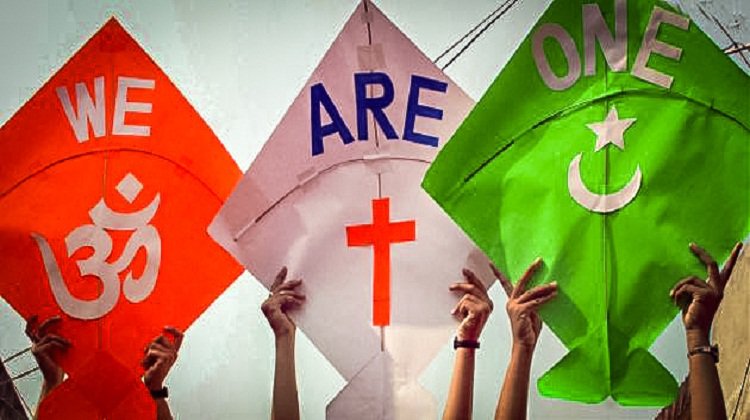It’s quite likely that Manmohan Desai’s principal aim in creating this classic of a film was not anything as lofty as creating a secular symbol of Indian cinema. It was most likely his aim to create an enjoyable and entertaining film that people would like to watch over and over again; a film where people could clap and cheer; perhaps cry a bit and emerge happy, satisfied and humming a ditty from the movie. It is a thoroughly formulaic, masala entertainer of a film but Amar Akbar Anthony is also a secular gem.
A recent book by three American scholars, Amar Akbar Anthony: Bollywood, Brotherhood, and the Nation (Harvard University Press) speaks about this exactly. William Elison, Christian Lee Novetzke and Andy Rotman, the authors are academicians in fields such as religion and anthropology had been in India as PhD students and had bonded over love for Indian cinema.

Amar Akbar Anthony is about religion, but still secular
We all know the story of three brothers separated at birth and brought up following different faiths due to a series of fateful events. When the three brothers meet as adults their camaraderie evolves not because of, but in spite of the disparity of their backgrounds: Amar the policeman, Anthony the owner of a bar, and Akbar a tailor/qawwali singer. The three are clearly adherents of their respective faiths and are even shown to belong to professions that are stereotypical for the communities that they belong to.
In spite of the fact that religion could be seen as a central construct in this film, it is almost incidental. The real take away from the film is how naturally a pluralistic and all encompassing society is shown to accept various faiths. It is about neighbours looking out for each other, believing that love, duty and basic human goodness is of paramount importance despite of the importance that their respective faiths clearly have for the protagonists.

Amar Akbar Anthony
Anthony worships in his church and attends Easter celebrations, Akbar sings qawwalis and performs the namaz, Amar is seen clearly to be Hindu, and yet they unite against wrongdoers; their friendship transcends all this as immaterial. When there is need to donate blood to an injured woman in hospital the three do so without question. The fact that the woman turns out to be their mother is an unbelievable cinematic coincidence but it makes for such marvelously heartwarming cinema!
Amar Akbar Anthony is a simple, uncomplicated film that depends upon many of Bollywood’s pet cinematic devices and yet delights us with the way that it celebrates the very idea of India.
Author – Reena Daruwalla





